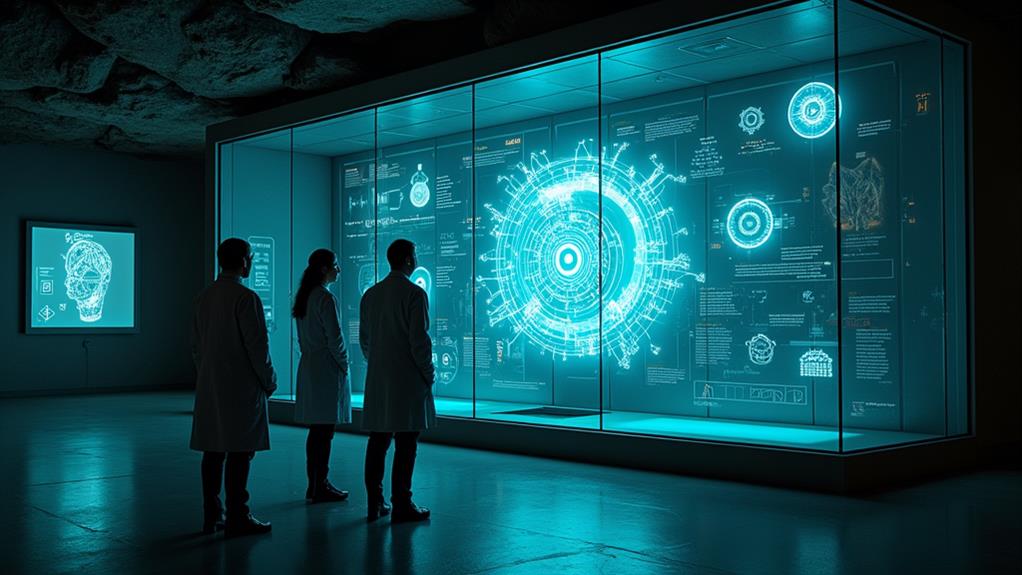Is the U.S. Hiding Alien Tech in Area 51?
You've probably heard the whispers about Area 51 and its connection to alien technology. This secretive base, primarily known for testing experimental aircraft, has become a focal point for speculation about what the government might really be hiding. With a history steeped in secrecy, numerous UFO sightings, and intriguing whistleblower accounts, you might wonder if there's more than just advanced military tech behind those gates. As you consider the implications of such revelations, you might find yourself questioning not only what's concealed there but also the broader impact on our understanding of humanity's place in the universe.
History of Area 51

Nestled in the Nevada desert, Area 51 has long ignited curiosity and speculation. Established in the early 1950s, this secretive military installation originally served as a testing ground for experimental aircraft. You might know it as Groom Lake, named after the nearby body of water, but its primary purpose was to develop advanced aerial technology during the Cold War.
The U.S. government initially kept the base under wraps, acknowledging its existence only decades later. As you explore its history, you'll find that the site played a significant role in the development of the U-2 spy plane and the SR-71 Blackbird, both groundbreaking aircraft of their time.
This heightened secrecy and the base's unique operations fueled rumors and conspiracy theories surrounding extraterrestrial technology.
In the 1980s, former employees began to speak out, claiming they witnessed unusual crafts and alien technology. This only added to the intrigue surrounding Area 51, leading many to believe the U.S. government was hiding more than just advanced military hardware.
Whether it's a hub for cutting-edge innovation or something more mysterious, Area 51 continues to captivate your imagination and spark endless questions.
Famous UFO Sightings
UFO sightings have captivated the public's imagination for decades, sparking both wonder and skepticism. You might remember the infamous Roswell incident of 1947, where an object crashed on a ranch in New Mexico.
Initially described as a "flying disc," the military quickly retracted that statement, claiming it was just a weather balloon. This shift only fueled conspiracy theories about extraterrestrial visitors.
Another notable sighting occurred in 1980 in the small town of Rendlesham Forest, England. Military personnel reported witnessing strange lights and a triangular craft near their base, leading to extensive investigations and ongoing debates about what really happened that night.
Then there's the Phoenix Lights incident in 1997, where thousands of witnesses saw a massive, V-shaped formation of lights glide silently over Arizona. This event received extensive media coverage and remains one of the most famous mass sightings in history.
You can't forget the Tic Tac incident in 2004, where Navy pilots encountered a fast-moving object off the coast of San Diego. Their video footage and testimonies reignited interest in UFOs, leading many to wonder what these encounters truly mean for humanity.
Government Secrecy and Disclosure

The veil of government secrecy surrounding UFOs has sparked intense curiosity and debate among enthusiasts and skeptics alike. You might wonder why the government remains tight-lipped about its findings, especially when numerous sightings and encounters have been reported. This secrecy raises questions about what really lies behind closed doors at places like Area 51.
Many believe that withholding information fuels conspiracy theories, while others argue that national security is at stake. You can see the tension between the desire for transparency and the need to protect sensitive information. When officials release documents, they often redact key details, leaving you with more questions than answers. This lack of clarity can be frustrating.
The recent push for disclosure has led to some governmental acknowledgment of UFOs, but it often feels like a half-hearted effort. You may feel the government should take a more proactive stance in addressing these phenomena.
As the debate continues, it's clear that the path to full transparency is fraught with challenges. Until the government decides to fully disclose its findings, you'll likely remain on the edge of your seat, enthusiastically seeking answers amid the shadows of secrecy.
Theories on Alien Technology
Speculation about alien technology has captivated the imagination of many, leading to a plethora of theories about what advanced capabilities extraterrestrial beings might possess.
Some theorists suggest that UFOs could utilize anti-gravity propulsion systems, allowing them to maneuver with incredible speed and agility, far beyond our current technology. Imagine what it would mean if we could harness such technology for our own space exploration efforts.
Others hypothesize that alien technology might involve advanced materials that can withstand extreme conditions or even self-repair. This could revolutionize industries ranging from aerospace to medicine.
You might also consider the possibility of energy sources far more efficient than fossil fuels, potentially changing the entire landscape of our energy consumption.
Additionally, some believe that alien tech might include advanced artificial intelligence, enabling machines to think and adapt in ways we're still attempting to achieve. This could lead to breakthroughs in automation and problem-solving.
Each theory fuels curiosity and wonder about what lies beyond our understanding. With every new hypothesis, you can't help but wonder if the secrets of alien technology might someday be revealed, reshaping our reality in unimaginable ways.
Whistleblower Accounts

While many theories about alien technology circulate in popular culture, whistleblower accounts provide a more grounded perspective on potential government involvement with extraterrestrial artifacts.
These firsthand testimonies often come from individuals who claim to have worked in or around classified military projects, particularly those associated with Area 51. You might find their stories both compelling and unsettling.
One prominent whistleblower, Bob Lazar, has claimed he worked on reverse-engineering alien spacecraft at a site near Area 51. His detailed descriptions of advanced propulsion systems and materials have fueled both intrigue and skepticism.
Then there's the account of a former military officer who reported witnessing unusual flying objects during training exercises, insisting that these weren't conventional aircraft.
These whistleblowers often face significant backlash, from ridicule to legal threats, which adds weight to their claims.
Their accounts, while controversial, provide insight into a world where secrecy reigns. If you're curious about the truth behind these stories, consider the motivations and risks these individuals take to share what they know.
As you explore these accounts, keep an open mind but also question the veracity of their claims.
Public Interest and Cultural Impact
Curiosity about alien technology has sparked a cultural phenomenon that transcends mere fascination; it fuels debates, inspires art, and shapes media narratives. You might find that countless movies, TV shows, and books draw on the mystique of Area 51 and the potential for hidden extraterrestrial tech. This cultural impact often reflects society's deeper anxieties about the unknown and our place in the universe.
As you explore online forums and social media, you'll see passionate discussions about the implications of alien technology, showcasing the public's desire for transparency and truth. Documentaries and podcasts plunge into the conspiracy theories surrounding Area 51, inviting you to question the narratives presented by mainstream media. This ongoing dialogue influences not only entertainment but also public policy, as citizens demand answers from their governments.
Artistic interpretations, from paintings to music, channel this intrigue, allowing you to engage with the enigmatic allure of the unknown. You may even find that alien tech discussions encourage you to think critically about scientific advancements and their ethical ramifications.
Ultimately, the cultural impact of these conversations shapes your worldview and invites a collective exploration of the cosmos.
Implications for Humanity

The potential existence of alien technology raises profound implications for humanity, challenging our understanding of science, ethics, and our place in the universe. If we were to confirm that advanced technologies exist beyond our own, it could revolutionize everything you know about physics, engineering, and even medicine. This knowledge might offer solutions to problems like climate change or energy scarcity, pushing humanity into a new age of innovation.
However, it also invites ethical dilemmas. You must consider who controls this technology and how it's used. Will it be weaponized, or could it lead to greater inequality as only a few gain access to these advancements?
Moreover, understanding our potential insignificance in the cosmic landscape might alter your perspective on life and existence. It could foster unity among humanity, as you'd realize that your differences pale in comparison to the vast unknown that lies beyond Earth.
Ultimately, the implications of alien technology challenge you to rethink your role in the universe, pushing you to weigh the benefits against the possible threats it poses to society as a whole. Embracing this knowledge could mean a transformative leap for all of humanity.
Conclusion
To sum up, the mystery surrounding Area 51 continues to spark curiosity and speculation about alien technology. While the U.S. government has acknowledged unidentified aerial phenomena, the lack of transparency fuels theories and public interest. Whether or not advanced extraterrestrial artifacts are hidden within its walls, the cultural impact of these ideas remains significant. As you explore this engrossing topic, consider how it shapes our understanding of humanity's place in the universe and the quest for knowledge beyond our world.


